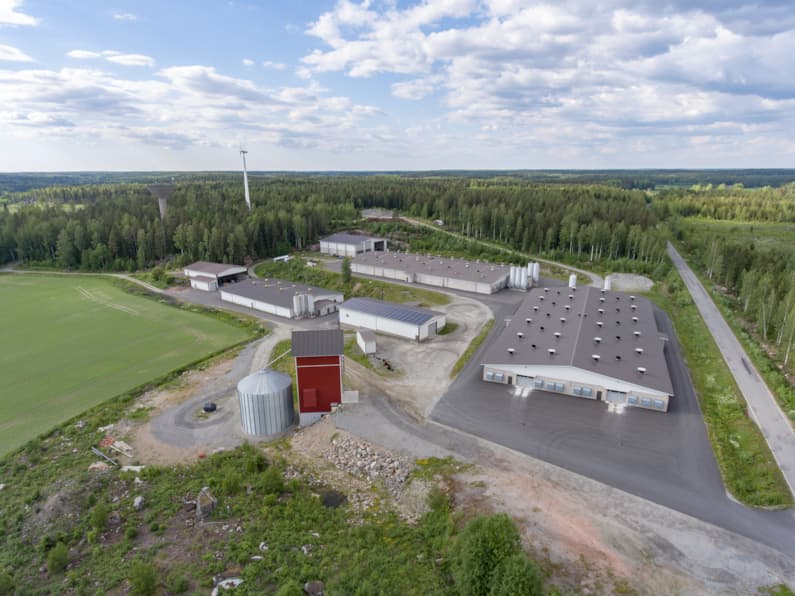Together with its contract farmers, HKScan promotes local carbon sequestration in its food chain. The new pilot project will fertilise 500 hectares of forest. The pilot aims to bind 5 million kilos of carbon (CO2) in 8 years.
HKScan is creating the future of responsible food production in the Baltic Sea region. The goal-oriented Zero Carbon climate plan aims for a carbon-neutral food chain by the end of 2040. HKScan is committed to setting science-based climate targets under the Science Based Targets initiative. In addition to significant reduction in emission sources, our Zero Carbon work includes increasing of carbon sinks together with contract farmers and partners. Solutions promoting carbon sinks are being examined on the fields of HKScan’s contract farmers and now also in the forest fertilisation pilot.
Fertilising with the environment in mind
The forest fertilisation pilot covers 500 hectares of forest in southern Finland. The forest plots were carefully selected with the environment in mind. The tree growth on the plots is already good to start with. This ensures that the growing trees make efficient use of nutrients and that fertilisation is carried out in an environmentally friendly way. It is safe to eat forest berries and mushrooms, because the same proven and safe fertilisers are also used in field farming.
“Fertilising significantly increases carbon sequestration in trees and accelerates the tree growth and hardening into logs. The use of logs in the production of furniture and wooden houses also increases the carbon stocks of long-lasting wooden products. Sustainable increase of carbon sinks and stocks in agriculture and forestry is a key part of the fight against climate change and this work we are examining in the network of HKScan Agrofood Ecosystem® together with our partners and contract farmers,” emphasises Ulf Jahnsson, HKScan’s VP, Strategic development primary production.
One-off fertilisation of pine and spruce stands in mineral soils increases stem growth by 10-20 cubic meters per hectare within 6-8 years of fertilisation. In addition to increasing carbon sequestration in trees, fertilisation also increases carbon sequestration and carbon stocks in other vegetation. It also increases the amount of carbon bound in organic matter in soil. This results from increased litter production and slower decomposition of organic matter.
“Fertilisation is an excellent way to increase carbon sequestration and carbon stock in forests. In this sense, fertilisation is a kind of climate action,” says Heli Peltola, Member of the Finnish Climate Panel and Professor of the University of Eastern Finland.
Measurement of carbon sequestration
The forest fertilisation pilot measures increased carbon sequestration in forests. Havulatva Oy is responsible for the practical implementation and carbon sequestration calculation in the pilot.
One extra cubic metre of tree growth sequesters one tonne of carbon dioxide from the atmosphere.
“Fertilising 500 hectares of forests sequesters 5 million kg CO2 during the fertilisation effect. The climate action corresponds to the annual carbon footprint of 500 Finns. Sampling inspections and calculation are carried out on forest plots to verify added carbon sequestration,” says CEO Samuli Kallio at Havulatva Oy.
“Forest fertilisation is a good practical example of how we promote local carbon sequestration with our farmers. With this pilot, we are not compensating for HKScan’s carbon footprint but we want to examine possibilities with an open mind. We are ready to scale the best practices for all our markets,” Jahnsson continues.
Contact:
-
Ulf Jahnsson, VP, Strategic development primary production, HKScan, tel. +358 400 784 193, ulf.jahnsson@hkscan.com
-
Samuli Kallio, CEO, Havulatva Oy, p. +358 40 535 1338, samuli.kallio@havulatva.fi
- Heli Peltola, Professor in Silvicultural Sciences at University of Eastern Finland, tel. +358 40 588 0005, heli.peltola@uef.fi
- HKScan Media Desk, communications@hkscan.com, tel. +358 10 570 5700
At HKScan, we make life tastier – today and tomorrow. Our strategic target is to grow into a versatile food company. Our responsibly produced, delicious products are part of consumers’ varied food moments – both every day and on special occasions. We have some 7,000 HKScan professionals applying more than 100 years of experience to make locally produced food. For us at HKScan, responsibility means continuous improvements and concrete actions throughout the food chain. As part of our Zero Carbon programme, we are targeting a carbon-neutral food chain from farms to consumers by the end of 2040. Our home markets cover Finland, Sweden, the Baltics and Denmark. Our strong product brands include HK®, Kariniemen®, Via®, Scan®, Pärsons®, Rakvere®, Tallegg® and Rose™. Through our strategic partnerships, we are also known for Kivikylän®, Tamminen® and Boltsi brands. HKScan is a publicly listed company, and in 2020, our net sales totalled nearly EUR 1.8 billion.

